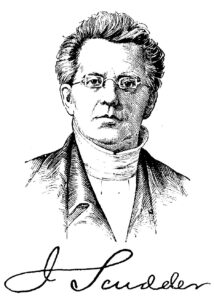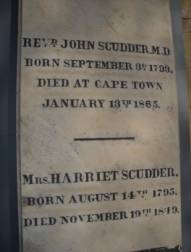

Last date for Registration -
20 September 2024

Dr. John Scudder was born in Freehold, New Jersey, on September 3rd 1793. He graduated in theology from Princeton (1811) and in medicine from College of Physicians in New York (1815). Right from his childhood, the spirit of benevolence and a selfless spirit were evident. Once he dragged a piece of log along the road. When asked why, “I am taking it to Miss Becky, who has no fire,” was his reply. She was also poor and infirm. Later he befriended a drunkard. On one of his visits, he was bold to ask him, “Why do people call you the Devil?” By gentle persuasion he made him give up drinking.
His spirit of kind service followed him as he started his medical practice in New York. He appeared to have had a peculiar knack of gaining the confidence of his patients. Families who were treated by him were so fascinated by his skill and kind manners, that they rarely went back to their doctors. As a busy medical practitioner in New York, he was earning over $2000/- per year which was a considerable sum at that time.
One night, while visiting a Christian patient, he found a tract lying on the table entitled, “The conversion of the World or the claims of six hundred million.” He borrowed it. Read it. Reread it. The message penetrated deep into his soul. Apparently his first response was that someone should answer the call and go to the missions. Almost in an unexpected lightening flash the call appeared to be directed at him. “Come over and help us.”

He accepted and confirmed this call only after his wife, Harriet, also unreservedly accepted this call by saying, “Where thou goest, I will go.” But his father, Joseph Scudder, a reputed lawyer, in his anger, disinherited him for venturing out on this “mad project”. Despite this, on June 8th, 1819, Dr. John Scudder, then 26 years old, boarded the ship Brig Indus along with his wife Mrs. Harriet Waterbury Scudder, daughter Maria and their maid Amy from Boston’s Fulton St. Dock to embark on a journey that would significantly alter the eternal destiny of many lives in this part of the world. The American Board of Commissioners for Foreign Mission was sending forth probably the world’s first medical missionary on a missionary endeavour.
The journey from Boston to Calcutta took four months, which formed his first missionary journey as he along with his fellow missionaries, converted the ship into a ‘Floating Bethel.’ It is said that when he started, there was hardly a Christian, and when they landed in Calcutta, there was hardly a non-Christian in the ship.
While transiting in Calcutta, they proceeded to Serampore to meet the man who is considered as the Father of modern missions, William Carey. While at Calcutta, little Maria was stricken with dysentery and died within three days. They then set out to Ceylon, to reach Jaffna where Dr. John Scudder established his first dispensary in Panditeripo. However, in Ceylon, their 2nd daughter who was born died soon after birth. The words of Dr. John Scudder at this point of time displays his out and out unqualified faith.
“This is a severe trial, but we do not repine… We must say that our trials have been heartrending. Perhaps our dear parents may be ready to say that we are sorry and repent of our coming. No, we rejoice and thank the great Head of the Church for putting it into our hearts to leave America and come and live among this people. I would not exchange situations for a world. Blessed be God, I hope to be the unworthy instrument of bringing souls to the dear Redeemer”.
Preaching was his first calling. Each morning, when patients gathered in his clinic, he always started by preaching the Gospel. Only then would he attend to their physical illnesses. Distributing tracts both written by hand on olai (palm leaf) or printed materials was the principal means of his ministry throughout his life. He also took up people under his tutelage for the purpose of Christian medical training – a step which inspired his descendants for many generations. After 18 years in Jaffna, which formed his second missionary journey, in 1836, he was transferred to Madras, where he began his third missionary journey.

Dr. John and Harriet had thirteen children, four died, the rest were seven sons and two daughters. Educating their children was a herculean task. Dr. Scudder took his two elder sons, Henry and William aged ten and eight and a half years to Colombo and put them on a ship bound to Boston, under the care of the captain of the ship. One went to Harriet’s parents and the other to another relative. The second one nearly lost his way, until a kind family friend took over his support and brought him back to complete his studies. For the parents it was the first of a long series of heart- rending ordeals which lasted more than a decade as they sent their little ones, two by two, half way around the world with small hope of ever seeing them again.

Did Rev. Dr. John Scudder ever dream about a mission venture in Vellore? He wrote in his diary on September 25th 1824, standing on the top of Vellore’s Fort Hill, “The view of the plain from this mountain is most charming. I had a most commanding sight of the whole city. It is very large. I also had an excellent view of the villages in the vicinity of Vellore. The tops of trees, which appeared at a distance; the paddy fields, in perfect green or yellow; the white bed of the river, which is nearly dry; the shades cast over a part of the plain by the passing cloud, while the full sunshine was on other parts of them; the fort, with its surrounding water and so forth, presented a scene which beggars all description. Vellore is not entirely surrounded by mountains, but you would be led to make such a supposition had you been where I was. Vellore is an excellent place for missionary labour. It needs a dozen of labourers …” Probably it was this vision that gave rise to the CMC college song, “Girded round by her ageless mountains…”

Over a hundred years later his granddaughter (Dr. Ida Scudder) went on to fulfil that dream. More importantly, over 40 of his descendants then went on to contribute over a thousand years (1074 years) in serving Christ in the mission field.
Committed, hard work, made Dr Scudder a very sick person. So, he was advised rest in the US. He went back and stayed there for four years. He just could not rest. He went through the length and breadth of US motivating adults and children to support the missionary work, being his fourth missionary journey. On return, he was posted in Madurai for a while, which formed his fifth missionary journey. While there, he had to deal with the caste system of India. King Thondaiman, refused to receive a Bible from Dr Scudder as he had to receive permission from his lord Bishop, to accept any literature.
Another high caste individual needed the medical care of Dr Scudder. However, he could not be ‘polluted’ by this Christian doctor. A way had to be found to know the will of the gods. So, a girl was sent blindfolded into a room where a bunch each of white flowers and red flowers were placed. She picked white flowers, which indicated that the gods permitted this man to be treated by Dr Scudder. He was healed soon after.
Sick as he was, everyone thought that Dr Scudder would be the first to enter heaven. It was the other way around. One Thursday, Harriet fell sick. It grew worse on Friday. By the following Monday, on November 18, 1849, she was gone. “She sweetly fell asleep in Jesus” with her family beside her as she exclaimed, “Glorious heaven! Glorious salvation!”
The whole family gathered around her during her dying moments. She shared her thoughts and last words very clearly. Her main thoughts were first of all for the salvation of some of their children who were not saved then. Then it was that all her sons should come to India as missionaries. It is said that she literally prayed her children into heaven.
Dr. Scudder’s two daughters were married to Europeans in India. One daughter who was married into the Stanes family of coffee fame, was a source of strong support to her brothers as they ministered in India. Fulfilling their mother’s wish, all the seven sons came back to India as missionaries. In the presence of Dr Scudder, the sons formed the American Arcot Mission, the forerunner of the mission work in and around Vellore.
Their significant mission contributions include CMC Vellore, Scudder Memorial Hospital at Ranipet, Voorhees College, Tindivanum High School, a vital role in the formation of the Church of South India and abolition of caste system in Mission churches, publishing scriptural literature in the local languages, translation of scriptures, Ladies Seminary at Chittoor, Palmaner lace making unit, and an elaborate organization of schools.
Even though Dr Scudder began to see the warning signs that the last enemy was advancing, he did not give up his work and continued with his usual zeal. He was in the field every day. His friends realized that he was hastening an event which could be postponed. He agreed therefore to the suggestion to take a sea journey and stop his work for some time. He had made his wish known, “I wish to die in India. There I would be buried, side by side with my beloved wife.” He did not want to make a second journey to America. He believed that India was closer to heaven than America.

So, he agreed to go to Cape of Good Hope. On January 13th1855, at Wynburgh, South Africa, after preaching in the morning service and taking rest before preaching in the evening service, Rev. Dr. John Scudder passed away into glory, without uttering one last word. Those that stood around him could not but exclaim, “Servant of God, well done! The glorious warfare is past. The battle is fought, the race is run. And thou art crowned at last.” Today, we celebrate his past and motivate for the future.
Hebrew 11:13-16 – All these died in faith, without receiving the promises, but having seen them and having welcomed them from a distance and having confessed that they were strangers and exiles on the earth. For those who say such things made it clear that they are seeking a country of their own and indeed if they had been thinking of that country from which they went out, they would have had opportunity to return. But as it is, they desire a better country that is a heavenly one.
